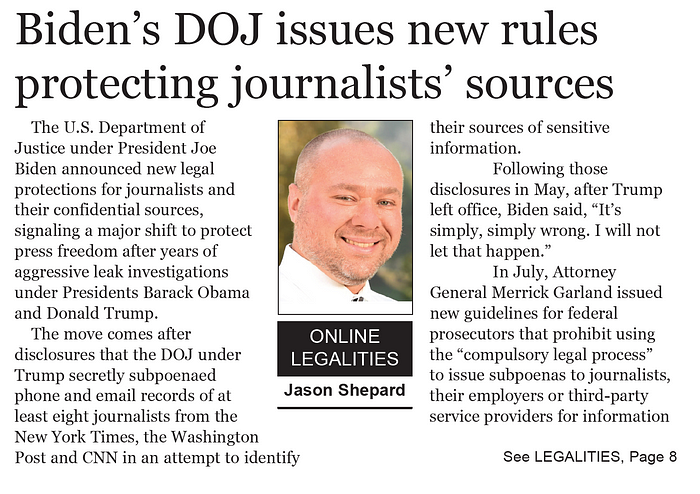Biden’s DOJ issues new rules
protecting journalists’ sources

Originally published in the Summer 2021 issue of California Publisher.
By Jason M. Shepard
The U.S. Department of Justice under President Joe Biden announced new legal protections for journalists and their confidential sources, signaling a major shift to protect press freedom after years of aggressive leak investigations under Presidents Barack Obama and Donald Trump.
The move comes after disclosures that the DOJ under Trump secretly subpoenaed phone and email records of at least eight journalists from the New York Times, the Washington Post and CNN, in an attempt to identify their sources of sensitive information.
Following those disclosures in May, after Trump left office, Biden said, “It’s simply, simply wrong. I will not let that happen.”
In July, Attorney General Merrick Garland issued new guidelines for federal prosecutors that prohibit using the “compulsory legal process” to issue subpoenas to journalists, their employers, or third-party service providers for information related to newsgathering.
While the guidelines can be changed by future administrations, they provide significant new protections for journalists and may serve as a blueprint for a long sought federal statute, often called a shield law.
Legal protections for journalists and confidential sources exist in a gray area. The U.S. Supreme Court ruled in 1972 that while a journalist’s right to protect confidential sources raises press freedom issues, there was no First Amendment right for journalists to avoid federal grand jury subpoenas. Many lower courts recognize a qualified privilege at the federal level, while Congress has tried but failed to pass a shield statute.
The new DOJ rules are important in many respects.
The policy removes a balancing test used by DOJ that gave the government too much authority to target journalists.
The balancing test “may fail to properly weight the important national interest in protecting journalists from compelled disclosure of information revealing their sources, sources they need to apprise the American people of the workings of their government,” Garland wrote in a memo outlining the new rules.
The exceptions are narrow. They include cases in which journalists are suspected of criminal activity unrelated to newsgathering, or to prevent imminent risk of death or serious bodily harm.
The new rules would prohibit many of the actions taken by the Trump administration in its investigation of journalists, the details of which are still coming to light.
News reports indicate some of the secret subpoenas targeted journalists who reported on stories about Russian influence in the 2016 election.
Some of the subpoenas came with gag orders against internet service providers from informing the subjects about the subpoenas. Some of the lawyers representing the news organizations were also prohibited from discussing the subpoenas with their clients, according to news reports.
“Secret proceedings, gag orders so CNN attorneys can’t speak to me, and eight reporters being swept up in investigations with no explanation — these are not part of a free press in the United States. I am genuinely horrified by what happened,” wrote CNN’s Barbara Starr, one of the reporters whose records were subpoenaed.
While the new rules provide protection for journalists, the new rules aren’t a panacea for reporters who cover sensitive information.
Once upon a time, journalists could be counted on to refuse to comply with a subpoena for their confidential sources, and usually get away with a slap on the wrist. But more aggressive leak investigations, coupled with an increasingly digital paper trail of communications and judges less sympathetic to press freedom concerns, have changed the landscape.
Government employees are vulnerable to investigation, and those suspected of leaking may be asked to disclose their interactions with journalists or have their records subpoenaed.
Under the last three presidential administrations, the federal government has prioritized the prosecution of leakers — some of whom are branded as whistleblowers or traitors, depending on your perspective.
Obama’s DOJ prosecuted more government employees and contractors for leaking information to journalists than any presidential administration before.
They include Thomas Drake, a senior National Security Administration official convicted of leaking information to the Baltimore Sun; Shamai Leibowitz, an FBI contractor convicted of leaking documents to a blogger; Stephen J. Kim, a State Department contractor convicted of providing unauthorized information to Fox News; Jeffrey Sterling, a CIA officer convicted of leaking information to James Risen of the New York Times; John Kiriakou, a former CIA officer convicted of revealing classified information to reporters; and Donald Sachtleben, a former FBI agent convicted of leaking to the Associated Press.
In several cases, the Obama administration prosecuted leakers under the Espionage Act and subpoenaed journalists for testimony or internet providers for journalists’ phone and email records.
Obama’s precedents paved the way for similar actions during Trump’s administration.
The Intercept reported in July that based on public records requests, criminal referrals for leak prosecutions increased dramatically during Trump’s presidency, including 120 referrals in 2017, 88 in 2018, and 71 in 2019.
At least eight government employees or contractors have been prosecuted or sentenced under Trump’s presidency for leaking to journalists, according to news reports.
The first was Reality Winner, an Air Force veteran and government contractor who was convicted of leaking to The Intercept evidence of Russian attempts to hack voting systems in the 2016 elections.
The Trump administration prosecuted many other government employees for leaking to journalists. A few examples:
Natalie Edwards, a former senior U.S. Treasury Department official, was sentenced to six months in prison for leaking financial “Suspicious Activity Reports” regarding Trump associates to BuzzFeed News reporter Jason Leopold.
Terry J. Albury was sentenced to four years in prison for sending confidential documents about FBI practices in recruiting confidential informants to The Intercept.
Joshua Shulte, a former CIA employee, was convicted of leaking to Wikileaks documents from 2013 to 2016 about the CIA’s ability to hack phones, cars, computers and smart TVs and turn them into listening devices.
Daniel Hale, a former Air Force intelligence analyst and government contractor, was convicted of leaking information to The Intercept’s Jeremy Scahill about the U.S. military’s expanding use of drones to kill combatants, and innocent civilians, in Afghanistan, Yemen, and Somalia.
Henry Kyle Frese, a former contract employee of the Defense Intelligence Agency, was sentenced in 2020 to 30 months in prison for leaking information to reporters about foreign military capabilities, including China’s installation of missile systems in the South China Sea.
James A. Wolfe, a top aide to the Senate Intelligence Committee for three decades, was sentenced to two months in prison after pleading guilty to lying to investigators about contacts with journalists.
The legal trends suggest that leak prosecutions will continue to create a chilling effect on journalist-source relations.
They also underscore the need for journalists and sources to be careful about the digital footprints they leave when communicating sensitive information.
Nonetheless, journalists and free press supporters hail the new Biden DOJ rules as an important step forward in making sure journalists’ newsgathering efforts don’t become targets of federal prosecutions.
“The attorney general has taken a necessary and momentous step to protect press freedom at a critical time,” Bruce D. Brown, executive director of the Reporters Committee for Freedom of the Press, said in a statement. “This historic new policy will ensure that journalists can do their job of informing the public without fear of federal government intrusion into their relationships with confidential sources.”
The actions by Biden and Garland are welcomed signs about respect for freedom of the press — something sorely needed after four years of an administration whose leader dubbed the press as the “enemy of the American people.”
Jason M. Shepard, Ph.D., is professor and chair of the Department of Communications at California State University, Fullerton. His primary research expertise is in media law, and he teaches courses in journalism, and media law, history and ethics. Contact him at jshepard@fullerton.edu or Twitter at @jasonmshepard.
